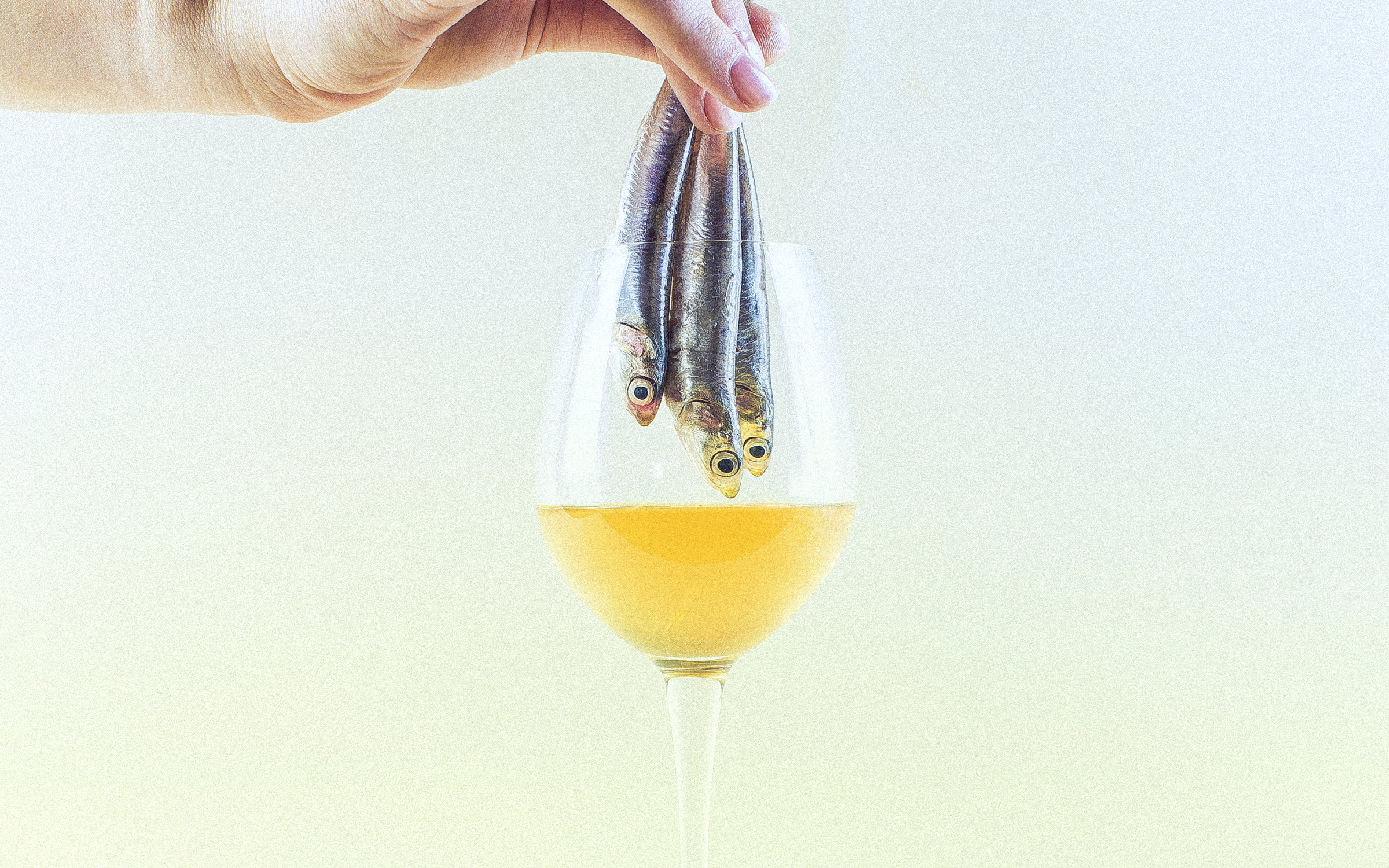The New Gastronome
Natural Wine vs. The Hangover
The Science Behind Hangovers
by Anna Elizabeth Hirschorn
by Anna Elizabeth Hirschorn

I was sitting at my local natural wine bar, Pét-Nat in hand, tattooed hipsters to my left and right, when my friend exclaimed, “I’m so glad we’re drinking natural wine! We won’t be hungover tomorrow!” The table, and a few of the tattooed, nodded in agreement as if this were obvious. “But why?” I asked, “What black magic do they add to natural wines?” I got a few mumbles about native yeasts and sulfites, none of which added up. Was this claim fact or fiction? I needed to get to the bottom of the mystery, not just the bottom of my glass. A brief online search was unfruitful in answering my query. Various mom blogs declare that natural wine delivers no hangover. Goop agrees…but keep in mind the site also recommends bee venom therapy and 8-day raw goat milk cleanses. Others, like Vox and GQ, think the Natural Wine, No Hangover Theory is nonsense.
A quick primer for those not in the know about natural wine: although the term “natural wine” is not officially defined, it generally refers to wines made with minimal human intervention. Occasionally known as low-intervention, naked, or raw wine, natural wine has inspired a cult following, particularly in young indie circles. So much so that labels – which often have an air of punk and insubordination – are obsessed over and collected like Beanie Babies in the ’90s. Natural wine only accounts for 2.6-3.6% of the global wine market, but it also seems to be all anyone’s talking about, particularly in young, urban hotspots where the majority of this consumption takes place.
Although there’s no strict definition, there are a few tenets of natural wine production. On the growing side, grapes must be free of herbicides, pesticides, and chemical fertilizers. The fruit must be handpicked, with no mechanization involved (this is hard). On the fermentation side, natural winemakers don’t add yeast, instead relying on native, wild yeasts, the bacteria that already exist in the grapes, the air, the barrels, etc. No additives are allowed, except for a small amount of sulfites right before bottling to preserve and stabilize the wine. These processes collectively lead to natural wine’s unpredictability, a quality that is denounced by its critics and lauded by its fans, who describe the fermented grape juice as zesty, textural, alive.
Conversely, conventional wine production legally permits 70 additives, from isinglass (a fish bladder derivative) to Mega Purple (look it up), and around ten times the amount of sulfites that can be found in natural wine. Most are quick to blame these sulfites for hangovers and celebrate natural wine’s lack of them as the key to its hangover resistant properties. But all wines contain sulfites – they’re a natural byproduct of fermentation. Also, one serving of dried figs or apricots can contain more than 1,000 times the amount of sulfites than a glass of wine. I don’t know about you, but I’ve never been hungover after eating dried fruits.
“So the more congeners and the more alcohol you consume, the more acetaldehyde you metabolize, the more you poison yourself, the more your Sunday morning feels like trash.”
Further, there’s evidence from the 8th century B.C. that Homeric Greeks were using sulphur in their wines: amphorae (the fermentation container of choice) were fumigated with sulphur to reduce microbial growth. But like sulfites, natural wine is a tradition, not just a trend. Humans have made wine for 8,000 years, with most cultures in most time periods unselfconsciously practising what we would now describe as “natural”. Some believe that wine drinkers began to fear sulfites when “CONTAINS SULFITES” started to appear on labels and caps, a scheme concocted by conservative U.S. senator Strom Thurmond to push people toward drinking less wine. So if sulfites aren’t causing head-pounding pain, what is?
At its core, a hangover is an alcohol withdrawal, your brain and body’s response to the discontinuation of alcohol consumption, writes Dr David Nutt, who has doggedly investigated the science of alcohol consumption and its health impacts. (All of a sudden, brunch cocktails are making so much more sense to me.) On average, hangovers hit 10 hours after blood alcohol peaks, though, of course, this depends on age, weight, sex, and genetics. But the biological and neurological underpinnings of a hangover are quite complex and multifaceted. Alcohol withdrawal symptoms can come from dehydration, your body’s inflammatory response, mitochondrial DNA damage, and/or an imbalance of glutamate and GABA, two of the brain’s most important neurotransmitters. But the reason that has been most linked to alcohol type is a group of chemical compounds called congeners, which may be a better hangover scapegoat than sulfites.
A. D. V. E. R. T. I. S. I. N. G.
Congeners are the toxins (besides alcohol itself) found in wine, side effects of fermentation and distillation. Recent research from Brown University in Rhode Island has found that the higher the level of congeners in an alcoholic beverage, the higher the chance of headaches and other hangover symptoms. One congener that is particularly implicated is acetaldehyde, a compound that is also a product of our body’s metabolization of ethanol (i.e. alcohol). Acetaldehyde is thought to be 10 to 30 times more toxic than ethanol itself. So the more congeners and the more alcohol you consume, the more acetaldehyde you metabolize, the more you poison yourself, the more your Sunday morning feels like trash. When it comes to wine production, grape skins, warmer fermentation, barrel ageing, air exposure, and additives are all linked to higher levels of congeners. (This generally means that darker alcohols, including red wine, have higher levels of them.) So it’s possible that some of the methods and supplements that are used by conventional wine production and not in natural wine production contribute to hangovers. But, for example, what if you compared the congeners in an unoaked unnatural wine with those in an oaked natural wine? Or a high-temperature-fermented orange wine (the skin-contact variety that’s the darling of the natural wine world) with a conventional white? No concrete studies have been conducted to provide a definitive answer.
So is it true that natural wine is hangover-free? Nope. But what is proven is that alcohol (and congeners) cause hangovers. Conventional wine has alcohol. Natural wine has alcohol. It’s possible that the absence of additional whatnots in natural wine takes a lighter toll on your metabolism, allowing your liver to flush out congeners more quickly and easily. But at the core of it, a high ABV wine is more likely to give you a hangover than a low ABV wine, regardless of its naturalness. This conclusion has been confirmed by my own very scientific studies at that local wine bar. So if reading about congeners, acetaldehydes, and sulfites has given you its own type of headache…I recommend you go grab a glass of wine.
Photo: ©Aarón Gómez Figueroa | Concept: Vroni Von Manz